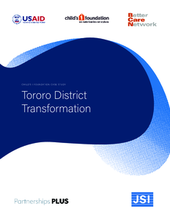Summary:
Based in Uganda, Child’s i Foundation successfully transitioned their residential programs before deciding to expand their vision and seek to bring about care reform to the entire district of Tororo. Partnering with the district level government and several CCIs, Child’s i Foundation carried out an extensive analysis and assessment of the Tororo region which provided information to guide the ensuing transitions of CCIs throughout the region.
Working with several different organizations, Child’s i provided technical support and guidance to bring many of the residential care services in the region to transition from residential care to other types of services. These individual transitions coupled with initiatives to empower the community to engage in gatekeeping, family strengthening, and the promotion of family-based care contributed to systems level care reform.
Background:
Child’s i Foundation (Child’s i), based in Uganda, began their transition journey by transitioning their own residential care facility called Malaika Babies Home. In 2016, after a time of intentional restructuring and visioneering, they decided to use their learning to support other organizations to transition from residential to family-based care. This time, instead of just focusing on the transition of individual services, they decided to pilot the transformation of the child protection and care system, at the district level. With support from Hope and Homes for Children (HHC), a clear vision, strategic plan, adequate funding and their own experience of transition, they began to consider what district they could partner with to realize their dream of achieving system wide transformation.
The district of Tororo in Uganda, located 4 hours away from Kampala, was quickly identified as an ideal location for the pilot. Child’s i had existing relationships with government, other organizations, and importantly, strong support from a probation officer from the local government who was willing to drive the change. In addition, some of the charitable children’s institutions (CCIs) in the area were already open to the idea of transition. Therefore, the team quickly decided to begin implementing their vision in this area.
In March 2016, Child’s i came into contact with Smile Africa Ministries (SAM), a residential care institution located in Tororo. The initial contact came through one of the donors who was involved in funding a new babies’ home on the SAM campus, in addition to general funding for SAM. This initial interaction evolved into a working relationship and agreement from SAM to transition with Child’s i’s support. In May 2016, Child’s i audited all of SAM’s case files, documentation, and internal processes in order to prepare a strategic plan. They also provided capacity training to the staff to prepare for deinstitutionalization and working alongside the local board of directors and founders to prepare the way for transition.
In August 2016, Child’s i signed an MOU with SAM for the transition. This new relationship had far-reaching benefits beyond the walls of SAM, as it served as a catalyst for working with the entire district and provided the groundwork to sensitize stakeholders in the area toward the necessity of family-based care. The willingness of this one CCI prepared the way for greater change and brought about a new understanding of the importance of deinstitutionalization.

